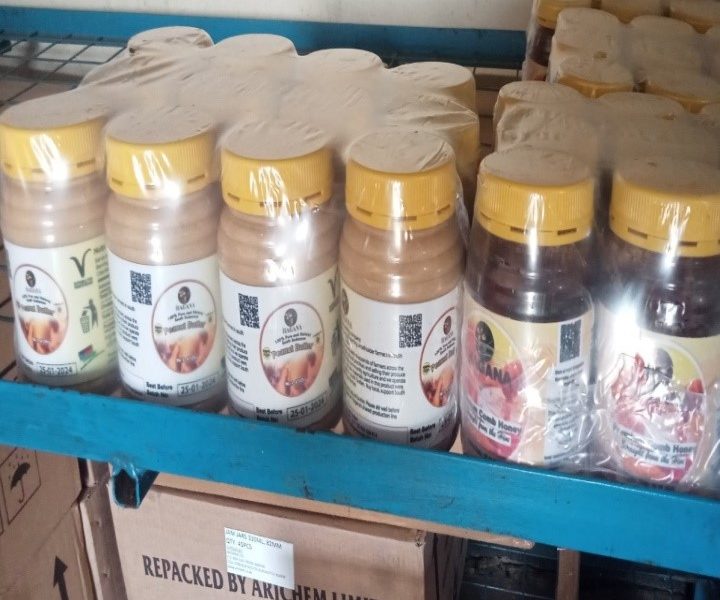By Bida Elly David
Local agro and processing companies in South Sudan have raised concerns over poor roads and multiple taxes levied against their exported products within the Country and to the neighboring Countries for commercialization as derailing business.
These concerns transpired during the 3rd made in South Sudan exhibition meeting meant to evaluate the status of national businesses in regards to access to market and productivity.
According to Hagana honey Agro processing company in South Sudan, several counties have a lot of honey but traders hardly venture there due to prohibitive levies and taxes imposed on honey transportation.
They said that due to high taxes and levies, natural honey from South Sudan is not competitive enough to enter the East Africa Community (EAC) regional market.
Hagana revealed that there were eleven revenue collection points between Maridi County and Juba noting that these multiple taxation points increase the cost of doing business and denied many honey collectors the opportunity to access markets.
The company disclosed a recent contract for transportation of natural honey to Kenya but they could not execute the deal due to high levies against the business.
“Kenyan Company had offered Hagana Co. a honey supply contract at USD 3,500 per ton, but due to high costs largely caused by arbitrary and multiple levies and taxes on transporting honey, Hagana Agro could only accept a minimum of USD 5,000 per ton and the deal failed to go through,” it said.
Mr. Matata Safi, CEO of Hagana Agro reported that 11% of honey producers are women, however, more women are involved at the processing and marketing stages of the value chain. Hagana honey is currently sold through 36 retail shops and 4 supermarkets in Juba.
They suggested elimination of multiple levies and taxes on goods moving within the Country to make South Sudan products competitive in the EAC and AfCFTA markets.
Hagana Company viewed out that Over 7 tons of honey processed and marketed annually mainly in South Sudan with a few exports to Japan and UAE. It further said about 550 farmers are engaged as suppliers of honey to the Company
According to Mr. Matata, Hagana Agro could expand annual honey production from the current 7 tons to over 30 tons annually if these levies and taxes were eliminated.
“South Sudan therefore has to eliminate these multiple levies and taxes on goods moving within the country to make South Sudan products competitive in the EAC and AfCFTA markets” he emphasized.
Meanwhile, ELAAG AGRI Company limited, an enterprise concerned with production of sesame and nuts, stated that over 30,000 tons of sesame and ground nuts are exported to Susan, Egypt and Uganda annually but tariffs and infrastructure impeded the exportation.
They added that the goods battle lack of standards as countries buying the raw commodities process them into finished goods and export them to other countries.
“Sesame and ground nut from South Sudan is exported to Sudan, Egypt and Uganda, trading companies in these Countries certify these products with their country’s mark of quality and standards then export the commodities as though they originated from these countries and not South Sudan,” they decried.
They added that other challenges include lack of access to financing, low processing and value addition capacity and pests and diseases infestation.
“Challenges facing shea butter processors include lack of standards and certification in South Sudan, lack of packaging materials, lack of access to finance. Finance for startups and expansion, poor road infrastructure leading to high transportation costs, insecurity in shea nut producing areas and lack of equipment for shea butter processing” they underlined.
According Estella Malek, the CEO of Aram Weer company, the company is one of the leading Shea Butter producing and marketing Companies in South Sudan launched in 2019.
She said that Aram Weer Shea Butter originated from Ms. Malek’s personal liking for the unique natural properties of shea butter as a body lotion and hair conditioner.
“Traditionally, shea butter was sold in markets in a variety of textures and colours. Using her own savings, Ms Malek decided to improve on the quality by buying and processing the nuts into shea butter with the help of two women as employees within Juba,”
The Aram Weer Shea Butter is sold in leading Supermarkets and retail stores in Juba. Some of it has been exported to Kenya, South Africa, Zambia, Ghana and Rwanda.
She echoed that demand for shea butter has also come from Europe and Middle East but Aram Weer has been unable to supply this market because the products lack quality certification and standards from South Sudan Bureau of Standards (SSBS).
“The problem is the lack of recognition of the SSBS by the international markets. A Warehouse has been established in Nairobi to serve the African markets. Products are transported from Juba to Nairobi via couriers and sold to consumers through commission agents,” she said
She said that the company offers scholarship for each female staff working for the company and provides salaries for its staff.




